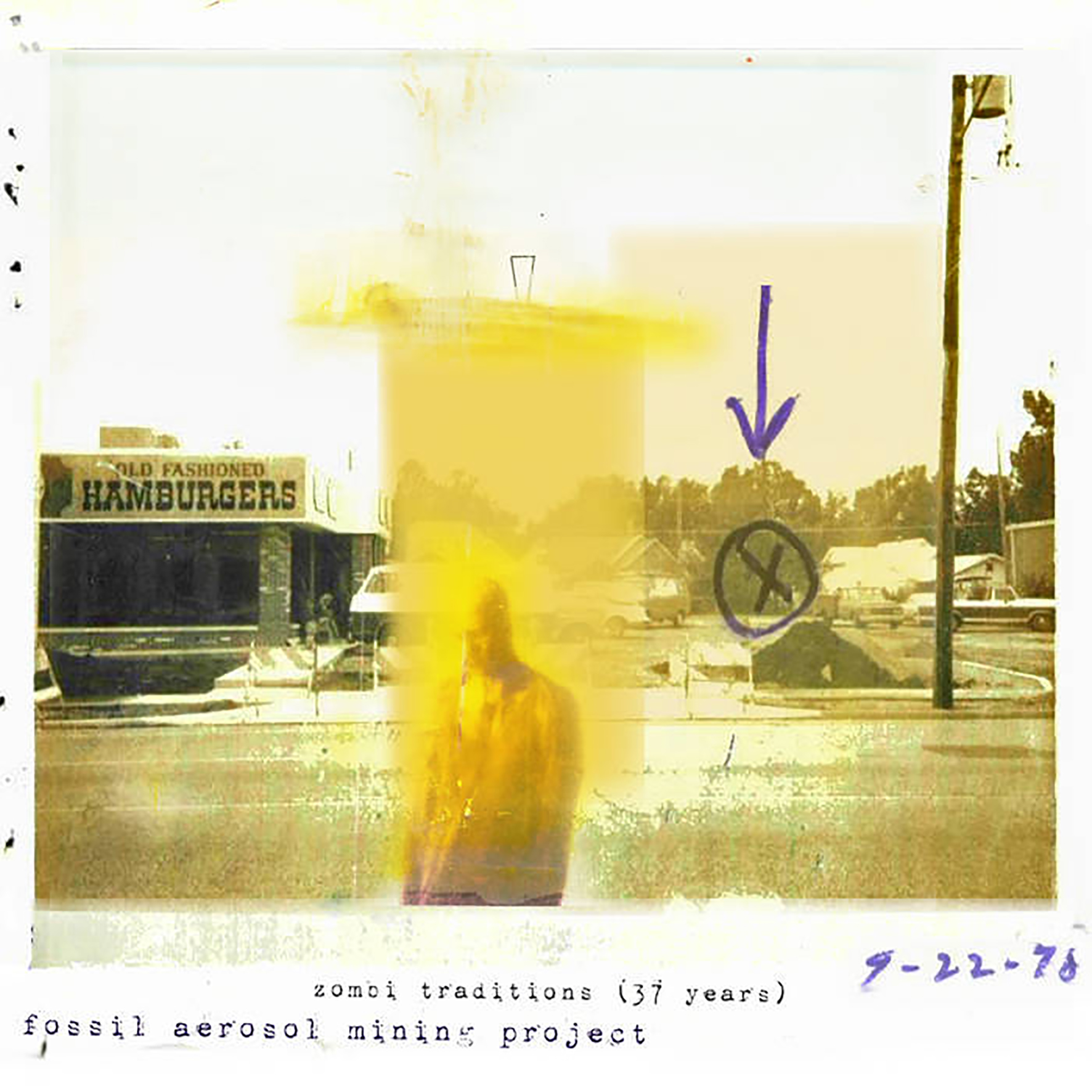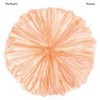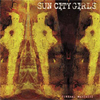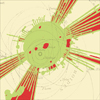 I probably do not follow the contemporary psych-rock scene as closely as I should, so this 2019 side project from Sweden's Hills managed to elude me for a couple of years. On one level, the leap from Hills to Centrum is not exactly a dramatic one, as För Meditation arguably resembles a Hills album with the electronic guitars and jammier tendencies excised. On a deeper level, however, the spell that Centrum casts is very different from that of most modern psych bands, as För Meditation feels like a lost classic from the late '60s/early '70s nexus where hallucinogens, Pandit Pran Nath, and eastern religion collectively transformed the more adventurous fringes of rock forever. In more practical terms, that means that För Meditation is full of droning, chanting, and raga-damaged psychedelia great enough to earn Centrum a place in my personal pantheon of Swedish psych/free music titans like Parson Sound and Träd, Gras och Stenar. They clearly also learned a trick or two from more recent bands too though, as they do an impressive job of sidestepping the genre's more indulgent tendencies and beautifully channel the killer ride cymbal grooves of classic Om (albeit opting more for hypnotic repetition than muscular intensity and virtuosic flourishes).
I probably do not follow the contemporary psych-rock scene as closely as I should, so this 2019 side project from Sweden's Hills managed to elude me for a couple of years. On one level, the leap from Hills to Centrum is not exactly a dramatic one, as För Meditation arguably resembles a Hills album with the electronic guitars and jammier tendencies excised. On a deeper level, however, the spell that Centrum casts is very different from that of most modern psych bands, as För Meditation feels like a lost classic from the late '60s/early '70s nexus where hallucinogens, Pandit Pran Nath, and eastern religion collectively transformed the more adventurous fringes of rock forever. In more practical terms, that means that För Meditation is full of droning, chanting, and raga-damaged psychedelia great enough to earn Centrum a place in my personal pantheon of Swedish psych/free music titans like Parson Sound and Träd, Gras och Stenar. They clearly also learned a trick or two from more recent bands too though, as they do an impressive job of sidestepping the genre's more indulgent tendencies and beautifully channel the killer ride cymbal grooves of classic Om (albeit opting more for hypnotic repetition than muscular intensity and virtuosic flourishes).
The album's description begins with a quote from David Lynch about transcendental meditation and its tenet that "true happiness lies within," but Centrum seem to enthusiastically embraced the Zen ideal of ego death as well, as the band's enigmatic line-up is given only as "members of Hills and Weary Nous." That anonymity admittedly makes sense here, as the focus is not on individual performances so much as it is on the band members seamlessly converging in perfect harmony for a series of great droning grooves. Or, as the label puts it, "beguiling tapestries of drone-based hypnosis, mantric vocal chants and ritualistic folk along with field recordings" (the latter made by the band in India). The opening "Vid Floden" is a representative introduction to that aesthetic, as a slow, heady groove of pulsing Shruti box swells, muscular bass riffage, hazy chanted vocals, and a cool flute hook unfolds for ten straight minutes with minimal evolution. There are some subtle effects and a decent amount of guitar soloing (both clean and distorted), but the magic primarily lies in how the various musicians interact and embellish the groove without ever breaking the spell with indulgent missteps. Instead, elements like the smoldering guitar solo in the following "Sjön" serve more of a textural and dynamic purpose than a cathartic or melodic one. That said, that solo does inject a soulful intensity that plays a significant role in making "Sjön" one of the album's strongest pieces. Of course, the warbling wah-wah improvisations and heavy ride cymbal beat play crucial roles as well (especially once the tambourine kicks in).
The remaining two pieces are unsurprisingly devoted to variations on the same themes. The brief "Stjärnor" is the closest thing to a single, as it distills the Centrum vision to a tight five minutes and enhances it with a melodic violin theme, but it also breaks the hypnotic spell a bit with a very prominent wah-wah solo in its final moments. The closing "Som En Spegel," on the other hand, heads in the opposite direction and stretches out for twelve epic minutes with little threat of derailing. Initially, it feels a bit too fast and too muscular to quite hit the raga/drone comfort zone, but it gradually blossoms into a masterful slow burn with the addition of tambourine, serpentine flute melodies, and a very cool finale of dub-inspired percussion flourishes. Aside from the mixed success of "Stjärnor," För Meditation is a damn near perfect album in my book. While it is not terribly hard to find other psych-rock bands who look to the east for inspiration, very few are able to match the natural chemistry and sublime execution that Centrum bring to the form.
Samples can be found here.



 This enigmatic Illinois collective has never been particularly keen on revealing much about themselves, but they do have something of an origin story in which the project was birthed when they fatefully discovered a section of a film trailer in an abandoned drive-in theater back in 1983. While I do not believe they ever specified which film they found, all signs point to a George Romero or Lucio Fulci film, as "sounds from films about fake corpses constitute some of the earliest material used by Fossil Aerosol Mining Project." In fact, the project nearly always sounds like a hallucinatory collage of badly distressed VHS tapes of Dawn of the Dead, but the project has also released several explicitly zombie-indebted releases over the course of their long and macabre career, some of which were eventually compiled on 2014's digital-only Zombi Traditions. As befits the subject material, those already remixed, remastered, and revised pieces have been cannibalized once more for this definitive edition. As the previous incarnations of these songs have been purged from existence, I cannot say how well these latest versions stack up against the earlier ones, but I can say that this is easily one of the best Fossil Aerosol Mining Project albums that I have heard. To my ears, this album is the embodiment of everything I love about this project, as it perfectly captures the imagined ambiance of a late '70s/early '80s mall where the only remaining signs of life are strains of kitschy muzak and cheery announcements of incredible bargains eerily reverberating around the ransacked, rubble-strewn, and desolate halls until the electricity eventually fails.
This enigmatic Illinois collective has never been particularly keen on revealing much about themselves, but they do have something of an origin story in which the project was birthed when they fatefully discovered a section of a film trailer in an abandoned drive-in theater back in 1983. While I do not believe they ever specified which film they found, all signs point to a George Romero or Lucio Fulci film, as "sounds from films about fake corpses constitute some of the earliest material used by Fossil Aerosol Mining Project." In fact, the project nearly always sounds like a hallucinatory collage of badly distressed VHS tapes of Dawn of the Dead, but the project has also released several explicitly zombie-indebted releases over the course of their long and macabre career, some of which were eventually compiled on 2014's digital-only Zombi Traditions. As befits the subject material, those already remixed, remastered, and revised pieces have been cannibalized once more for this definitive edition. As the previous incarnations of these songs have been purged from existence, I cannot say how well these latest versions stack up against the earlier ones, but I can say that this is easily one of the best Fossil Aerosol Mining Project albums that I have heard. To my ears, this album is the embodiment of everything I love about this project, as it perfectly captures the imagined ambiance of a late '70s/early '80s mall where the only remaining signs of life are strains of kitschy muzak and cheery announcements of incredible bargains eerily reverberating around the ransacked, rubble-strewn, and desolate halls until the electricity eventually fails. If you hang around enough basement shows, if you listen to enough record collector shop talk, if you read lists of your favorite obscure musicians listing their favorite obscure musicians, then you just may have heard of the Dead C. Two decades into the game, the band has not swerved from their distinctive brand of tangled, noisy improvisational rock. To that end, Patience delivers no surprises, no attention-grabbing gestures towards a wider audience, just a steady devotion to raw, monolithic sound.
If you hang around enough basement shows, if you listen to enough record collector shop talk, if you read lists of your favorite obscure musicians listing their favorite obscure musicians, then you just may have heard of the Dead C. Two decades into the game, the band has not swerved from their distinctive brand of tangled, noisy improvisational rock. To that end, Patience delivers no surprises, no attention-grabbing gestures towards a wider audience, just a steady devotion to raw, monolithic sound. After over two years of recordings, swapping files and reworking each others' material, this collaboration between Steven Stapleton and Larsen has been long awaited. Regrettably, the end result is not uniformly great as the album has a number of pieces which do not reflect the best capabilities of either party. Yet, all is not lost as there is gold here amongst the debris. Some brilliant sounds are sandwiched between other less exhilarating pieces.
After over two years of recordings, swapping files and reworking each others' material, this collaboration between Steven Stapleton and Larsen has been long awaited. Regrettably, the end result is not uniformly great as the album has a number of pieces which do not reflect the best capabilities of either party. Yet, all is not lost as there is gold here amongst the debris. Some brilliant sounds are sandwiched between other less exhilarating pieces. Originally a series of 7" split singles released on the Trensmat label, this compilation collects all the original releases on one CD and also includes a few covers not previously released as part of the series. Featuring a fantastic selection of bands (this is not a collection of also-ran bands doing a crappy tribute album) which for me are mainly an improvement on the originals. Hawkwind are one of those bands whose influence I appreciate more than their original recordings and to hear some bands I truly love interpreting their music has given me a new found enthusiasm for Hawkwind themselves.
Originally a series of 7" split singles released on the Trensmat label, this compilation collects all the original releases on one CD and also includes a few covers not previously released as part of the series. Featuring a fantastic selection of bands (this is not a collection of also-ran bands doing a crappy tribute album) which for me are mainly an improvement on the originals. Hawkwind are one of those bands whose influence I appreciate more than their original recordings and to hear some bands I truly love interpreting their music has given me a new found enthusiasm for Hawkwind themselves. With his custom guitar and unconventional playing techniques, Fongaard is one of the unrecognized innovators of prepared guitar, even in his native Norway. Here, three discs of his work, and a DVD, are lavishly presented to hopefully increase the recognition of this artist. There is a lot of material to digest but it is well worth the effort and presents a distinct missing link in the world of experimental guitar.
With his custom guitar and unconventional playing techniques, Fongaard is one of the unrecognized innovators of prepared guitar, even in his native Norway. Here, three discs of his work, and a DVD, are lavishly presented to hopefully increase the recognition of this artist. There is a lot of material to digest but it is well worth the effort and presents a distinct missing link in the world of experimental guitar. After the dissolution of his criminally underrated Band of Susans project, Robert Poss continued his obsession with the various noises of the electric guitar, no longer restrained by the constraints of "rock" music (though he pushed those boundaries pretty hard with BoS). Settings is a collection of music recorded for various purposes, but follows the concepts established on his 2002 album Distortion is Truth, reveling in the dissonant and not so dissonant tones of both guitar and analog synthesizer technologies.
After the dissolution of his criminally underrated Band of Susans project, Robert Poss continued his obsession with the various noises of the electric guitar, no longer restrained by the constraints of "rock" music (though he pushed those boundaries pretty hard with BoS). Settings is a collection of music recorded for various purposes, but follows the concepts established on his 2002 album Distortion is Truth, reveling in the dissonant and not so dissonant tones of both guitar and analog synthesizer technologies. Over the course of their incredible 27-year career, Sun City Girls seemed to make a point of doing everything as triumphantly and aggressively wrong as possible, precluding any possibility of widespread acceptance. While they certainly recorded their share of awesome psychedelic jams and inspired ethnic music appropriations over the years, their anarchic sense of humor and love of absurdist theatrics resulted in an accompanying avalanche of baffling and wildly self-indulgent work as well. Of course, that eccentric unpredictability and willingness to try literally anything was central to their charm. Consequently, Funeral Mariachi makes the most fitting of swan-songs, as they’ve finally done the most unexpected thing of all: made an album of very listenable, melodic songs.
Over the course of their incredible 27-year career, Sun City Girls seemed to make a point of doing everything as triumphantly and aggressively wrong as possible, precluding any possibility of widespread acceptance. While they certainly recorded their share of awesome psychedelic jams and inspired ethnic music appropriations over the years, their anarchic sense of humor and love of absurdist theatrics resulted in an accompanying avalanche of baffling and wildly self-indulgent work as well. Of course, that eccentric unpredictability and willingness to try literally anything was central to their charm. Consequently, Funeral Mariachi makes the most fitting of swan-songs, as they’ve finally done the most unexpected thing of all: made an album of very listenable, melodic songs. ESP Disk's most recent re-issue of the now well-known and loved Heliocentric Worlds series is haphazard and sloppy, offering only the most minimal improvements over their last re-issue from 2005. Fledgling Ra listeners will be happy to find all three volumes together in one package (this time on three distinct discs), but everyone else will likely be disappointed by the lackluster bonus material, mediocre packaging, and poorly edited liner notes. Anyone who owns all three albums already can safely ignore this release, the rest of us can bemoan its poor presentation.
ESP Disk's most recent re-issue of the now well-known and loved Heliocentric Worlds series is haphazard and sloppy, offering only the most minimal improvements over their last re-issue from 2005. Fledgling Ra listeners will be happy to find all three volumes together in one package (this time on three distinct discs), but everyone else will likely be disappointed by the lackluster bonus material, mediocre packaging, and poorly edited liner notes. Anyone who owns all three albums already can safely ignore this release, the rest of us can bemoan its poor presentation. This three disc set sees the reissue of Charlemagne Palestine’s masterpiece for the piano along with two previously unreleased versions of the piece for harpsichord and string ensemble. "Strumming for Bösendorfer Piano" is a landmark of modern composition, a return to first principles typical of that generation of minimalist composers. Eschewing complex forms and technique, Palestine instead chases the pure sound lurking within the piano and uses the instrument in a way that was revolutionary then and remains just as stunning now.
This three disc set sees the reissue of Charlemagne Palestine’s masterpiece for the piano along with two previously unreleased versions of the piece for harpsichord and string ensemble. "Strumming for Bösendorfer Piano" is a landmark of modern composition, a return to first principles typical of that generation of minimalist composers. Eschewing complex forms and technique, Palestine instead chases the pure sound lurking within the piano and uses the instrument in a way that was revolutionary then and remains just as stunning now.
